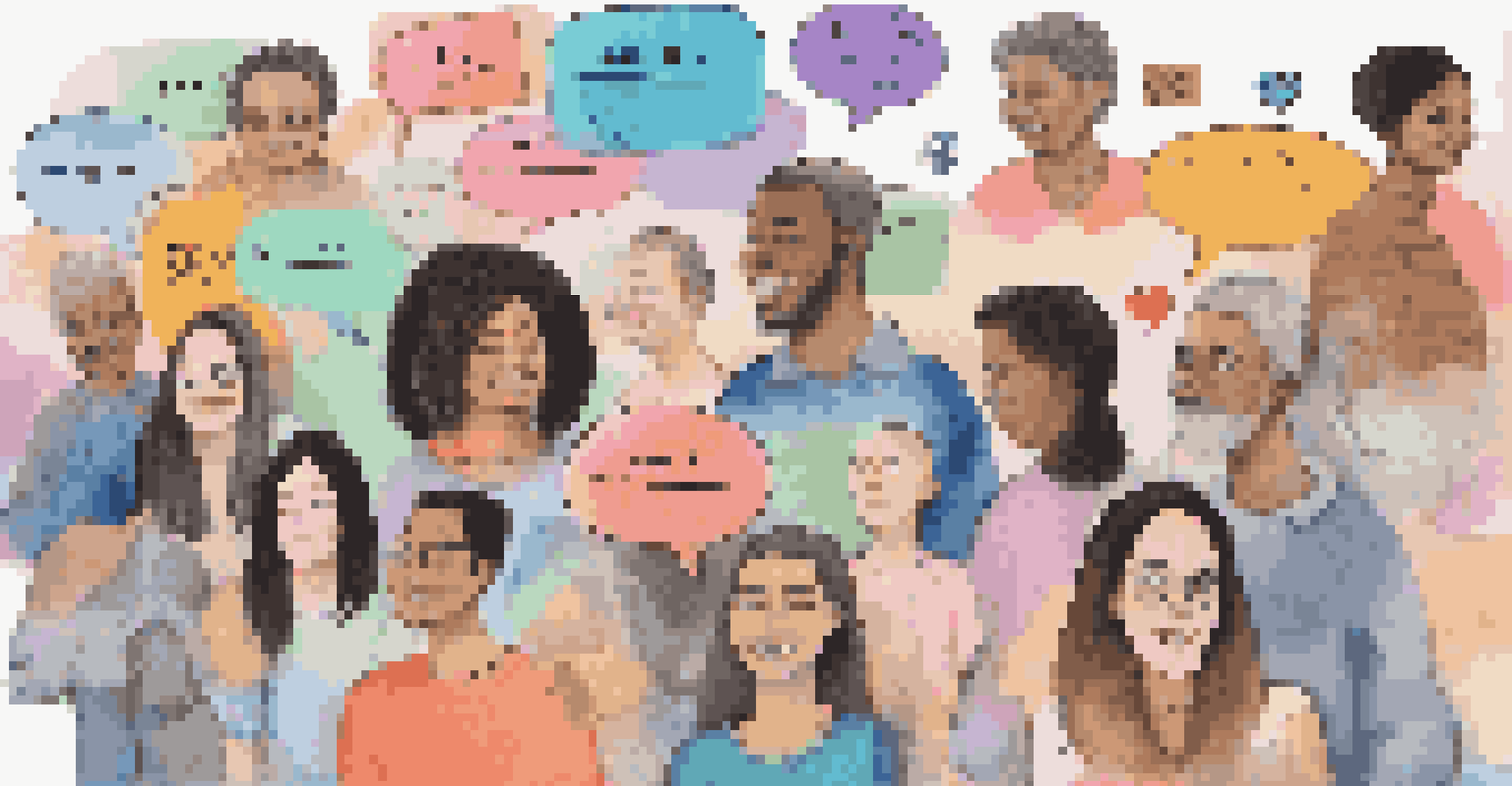The Influence of Social Media on Emotional Support Networks

Understanding Emotional Support Networks in the Digital Age
Emotional support networks are essential for mental well-being, providing comfort and understanding during tough times. Traditionally, these networks consisted of family and friends, but social media has expanded this concept. Now, individuals can connect with others facing similar challenges, regardless of geographic barriers. It's like having a global support group at your fingertips, where empathy and shared experiences thrive.
We are all in this together, and we are stronger together than we could ever be alone.
Social media platforms like Facebook, Twitter, and Instagram allow users to share their struggles and triumphs openly. This sharing creates a sense of community and belonging, which can be incredibly powerful for those who feel isolated. For instance, someone battling anxiety can find groups dedicated to mental health support, fostering connections that might not exist in their immediate surroundings. This shift signifies a new era in how we seek and receive emotional support.
However, it's essential to recognize that while social media can enhance support networks, it also presents challenges. The nature of online interactions can sometimes lead to misunderstandings or superficial connections. Therefore, navigating these digital landscapes requires awareness and intentionality in fostering genuine relationships.
The Role of Online Communities in Providing Support
Online communities have emerged as vital sources of emotional support, often filling gaps left by traditional networks. These groups can be centered around specific issues, such as mental health, grief, or parenting, allowing members to share advice and encouragement. The anonymity of the internet can also empower individuals to speak more freely about their feelings, leading to deeper conversations and connections.

Take, for example, a Facebook group for individuals with chronic illness. Members can share experiences, coping strategies, and even vent about their frustrations, creating a safe space where empathy flows. These interactions can significantly reduce feelings of loneliness and isolation, reminding members that they're not alone in their struggles. In many ways, these online communities act as lifelines for those in need.
Social Media Expands Support Networks
Digital platforms allow individuals to connect with others facing similar challenges, creating a global support community.
However, it's crucial to approach these communities with a discerning eye. Not all interactions will be positive, and misinformation can spread quickly. Encouraging members to seek professional help when needed is essential for maintaining a healthy balance between online support and professional guidance.
Social Media's Impact on Mental Health Awareness
Social media has played a pivotal role in raising awareness about mental health issues. Campaigns and movements, such as #BellLetsTalk or #MentalHealthAwareness, have gained traction, encouraging open conversations about mental health. This increased visibility can reduce stigma, making it easier for individuals to seek help and support from their networks.
The greatest gift of human beings is that we have the power of empathy.
Moreover, influencers and public figures sharing their mental health journeys have created relatable content that resonates with many. When someone sees their favorite celebrity discussing anxiety or depression, it humanizes these experiences and fosters a sense of connection. This visibility can encourage others to share their stories, building a community of understanding and support.
That said, while social media can amplify awareness, it’s important to approach information critically. Not all content shared online is accurate or helpful, so individuals should rely on reputable sources and professionals for guidance. Balancing online information with professional advice is key to maintaining mental well-being.
The Positive Effects of Social Media on Connection
One of the most significant benefits of social media is its ability to foster connections among individuals facing similar challenges. For example, support groups for those dealing with grief or addiction can create a safe haven where members share personal stories and coping strategies. These connections can lead to lasting friendships, as people find comfort in shared experiences.
Social media also allows for real-time communication, making it easier to reach out for support when needed. A quick message or comment can provide immediate reassurance, reminding individuals that they are not alone. This instant access to support can be particularly beneficial during moments of crisis, where timely encouragement can make all the difference.
Challenges of Online Emotional Support
While social media can foster connections, it also presents risks like negativity, misinformation, and unrealistic comparisons.
However, while these connections can be uplifting, it's vital to maintain a balance. Over-reliance on social media for emotional support can lead to feelings of inadequacy or comparison. Encouraging healthy boundaries and combining online support with in-person connections can create a more robust emotional safety net.
Challenges of Seeking Support on Social Media
While social media offers numerous benefits, it also presents challenges when seeking emotional support. The anonymity of the internet can sometimes lead to negativity, cyberbullying, or toxic interactions. This can deter individuals from sharing their feelings or seeking help, ultimately undermining the support networks they hoped to find.
Additionally, the curated nature of social media often leads to unrealistic portrayals of life, making it easy to compare oneself to others. When people see others seemingly thriving, it can create a sense of inadequacy, leaving them reluctant to seek support. This highlights the importance of understanding that social media often showcases a highlight reel, not the full picture.
Encouraging authenticity and vulnerability in online interactions can help mitigate these challenges. By sharing both struggles and successes, individuals can foster a more supportive and realistic environment where everyone feels valued and understood.
Navigating the Fine Line Between Support and Oversharing
Navigating social media for emotional support requires a balance between sharing and oversharing. While opening up can foster connections, too much personal information can lead to discomfort or unwanted attention. It's crucial to establish boundaries about what to share, ensuring that interactions remain safe and supportive.
Consider the difference between sharing a general experience, like coping with stress, and detailing all personal struggles. The former can initiate healthy discussions, while the latter may leave individuals vulnerable to judgment or misunderstanding. Finding that sweet spot is key to maintaining a positive online presence.
Future of Support Networks is Bright
Technological advancements and growing mental health awareness will lead to more specialized and effective emotional support communities.
Encouraging discussions about boundaries within online communities can promote a healthier atmosphere. By creating guidelines around sharing, members can feel safe and supported while fostering meaningful connections without crossing personal boundaries.
The Future of Emotional Support Networks on Social Media
As social media continues to evolve, so too will the ways we seek and provide emotional support. Innovations in technology, such as AI-driven chatbots, are beginning to offer immediate assistance for those in need. These tools can complement human connections, providing resources and support at any hour of the day.
Moreover, as awareness around mental health grows, we can expect to see even more dedicated platforms focused on emotional wellness. Communities will likely become more specialized, allowing individuals to find support tailored to their unique experiences. This evolution could lead to more effective and meaningful support networks.

Ultimately, the future of emotional support on social media lies in fostering authentic connections. As we navigate this digital landscape, prioritizing empathy, understanding, and genuine interactions will be crucial in creating a supportive environment for everyone.